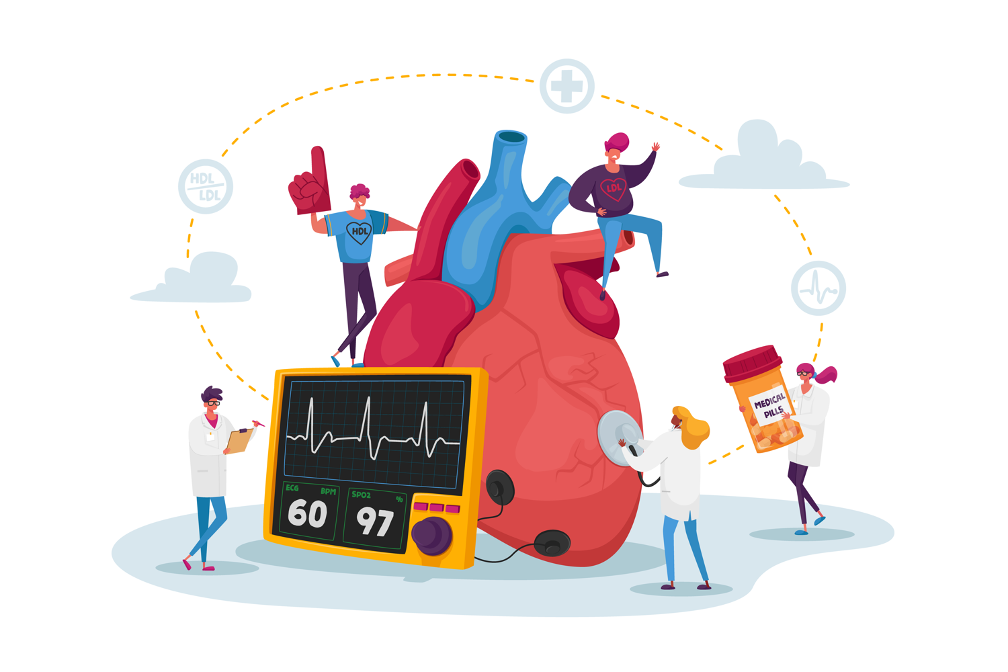Heart disease is the most common cause of death in the United States, claiming 1 in every 5 deaths each year. In addition to age, gender and family history, several health conditions can increase an individual’s risk of heart disease.
While you may already know about some of the common health risks for heart disease, you might not be aware of them all. To help give you a better understanding, this family medicine specialist will review five common health conditions that increase your risk of heart disease.
High Blood Pressure (Hypertension)
High blood pressure is one of the most common risk factors for heart disease. Hypertension refers to abnormally high blood pressure, determined by measuring two numbers — your systolic and diastolic blood pressure. If your systolic or diastolic numbers are above 120 or 80, respectively, you are considered to have hypertension. A family medicine specialist may prescribe certain medications, like beta blockers and angiotensin receptor antagonists, to help lower blood pressure.
High Cholesterol
Having a high cholesterol level means you have more LDL (bad) cholesterol than HDL (good) cholesterol. Over time, these deposits can build up in your blood vessels, which increases your risk for heart disease. There are multiple risk factors for high levels of LDL, including a diet full of saturated fat and trans-fat and physical inactivity. If you have been diagnosed with high cholesterol, your family medicine specialist will recommend reducing your intake of fatty foods while upping your activity level.
Diabetes
If you have diabetes, your body does not make enough insulin or cannot use its own insulin effectively. As a result, your blood sugar levels remain high for long periods, which can lead to numerous complications, including damage to your heart. If you already have cardiovascular disease when you are diagnosed with diabetes — regardless of your age — your chances of having a heart attack or stroke increase significantly over the next year.
Obesity
Being overweight or obese is a serious medical concern. Excess weight puts you at risk for high cholesterol, which can lead to plaque buildup in your arteries, increasing your risk of heart complications. The best way to lose weight safely is to make small lifestyle changes like eating better and adding exercise to your day-to-day routine. These steps help you drop pounds without yo-yo dieting and reduce symptoms like high blood pressure and diabetes associated with excess weight gain.
Uncontrolled Stress
Stress is not exactly a common trigger of heart disease, but it can amplify certain conditions that increase your risk. If you are going through some difficult times and can’t seem to control how you handle stress — whether through deep breathing, exercise, therapy, or other positive methods — it might be time to speak with your doctor about ways to protect yourself from developing heart disease.
Final Thoughts
Heart disease is the No. 1 killer in America, but that does not mean it is inevitable that you will contract it. In fact, there are many steps you can take to lower your risk of heart disease.
The first step is to assess your risk factors and ensure that you are not unknowingly contributing to heart disease by taking certain health conditions into account. By knowing what these conditions are and how they affect heart health, you will be able to mitigate or eliminate them from your life.
And don’t forget about your regular family doctor visits. Visiting a family medicine specialist is one simple way to keep track of any potential heart risks.
Looking for an Affordable Family Medicine Specialist in Northwest Indiana?
Are you ready to take control of your heart health? If so, 219 Health Network is here to help. As the top-rated affordable family medicine specialists in the area, our licensed family medicine physicians are here to help you manage any health conditions you may have. Contact us today to learn how we can help.


